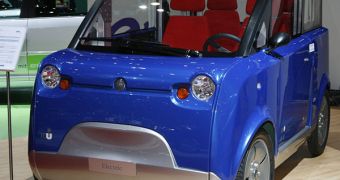Despite the fact that the global recession is expected to hit the automotive industry pretty hard, car makers in Japan took it upon themselves to spearhead the international effort in creating the first totally clean car, to run either on electricity, fuel cells, or hydrogen. Although this concept may seem a thing of the future, representatives of Japan's fourth-biggest manufacturer, Mitsubishi Motors Corp., say that such models could hit the street starting 2010.
Thus far, the only thing that holds back the mass production of electric vehicles is their limited range per battery, as in the distance they can travel with one charge. Such limitation makes them impractical in the case of most purposes a car is used for, and even commuters might have a hard time riding in one of these automobiles.
Another drawback is the fact that there is currently no infrastructure to support drivers who own such cars, that is stations with power outlets designed especially for these vehicles, for instance.
The iMiEV electric car, designed by Mitsubishi, is said to have an autonomy of 160 kilometers (100 miles) per charge, thanks to new breakthroughs in the study of lithium-ion batteries. Japanese manufacturers expect the pace of innovation in this field to remain the same over the years, and the battery capacity to triple in less than 10 years.
Nissan, on the other hand, advocates the construction of a fuel cell car, to use the chemical reactions between hydrogen and oxygen as a power source, with the only byproduct being water. Honda also moves in this direction, as proven by the fact that its latest concept, the FCX Clarity, can travel 620 kilometers with a single charge. A change of cells only lasts 3 to 4 minutes, which is also lower than the average 14 hours an all-electric car needs in order to be fully charged.
In anticipation of the innovations that the automotive industry will benefit from, Japan has already built 12 hydrogen pumping stations across the country, with plans to raise even more starting with 2015, when the number of people driving such automobiles is expected to increase. The only thing standing in the way of implementing these vehicles globally is the economic downturn, which virtually closes all markets for them, despite the fact that, in the long run, they could save their owners a lot of money.

 14 DAY TRIAL //
14 DAY TRIAL //